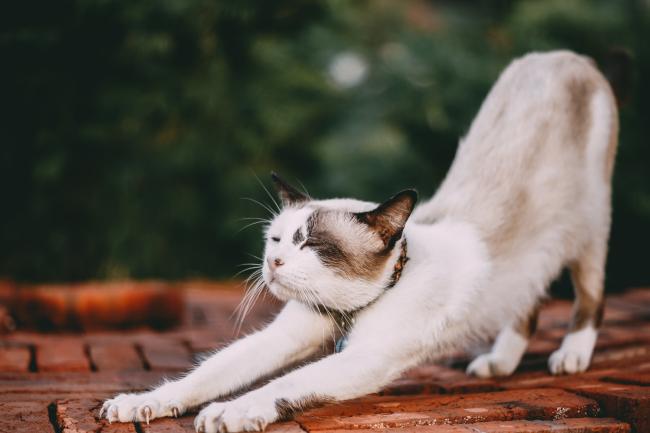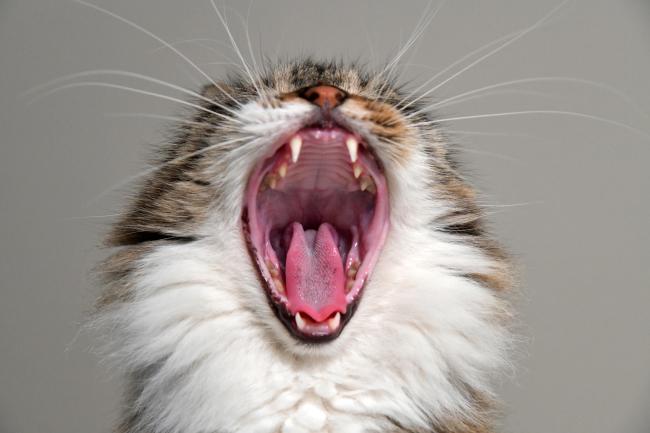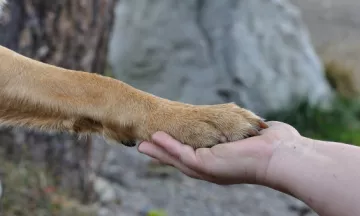Everything you need to know about cat behaviour
To give your beloved cat a happy, long life, it's super important to understand cat behaviour. Likewise, it's critical to understand cats if you are a cat sitter. What makes cats tick, what makes them cranky and what do they need to be happy?
Although cats might seem aloof, there is a lot of subtle nuance going on with their behaviour. Understanding cat behaviour can help you to connect with the felines you meet more easily. Here's everything you need to know about cat behaviour.

Cat communication
If you are a cat owner or cat sitter, it's important to understand cat communication. This includes a cat's body language and the cute noises they make.
Unlike a dog, a cat's body language can be much more subtle to read. A cat will use its tail, posture, movement, ears and eyes to express emotions. Some examples include:
- Saying hello: slow blinking, head bunting or approaching with tail up.
- Fear: tail puffed up, body pressed flat to the ground with whiskers extended.
- Annoyance: tail swishing, which increases as the cat becomes more annoyed.
- Anger: ears turned out, tail puffed, whiskers pointed forward with their back arched.
- Pain: withdrawn, ears rotated outward, eyes partially or fully closed.

Likewise, there is a lot to unpack with the various sounds cats can make. Mewing, purring, yowling, hissing: there's no doubt that cats can be incredibly vocal creatures. It's interesting to note that cats only meow at humans and this is usually to get something that they want! Here's what you need to know about cat meowing.
Purring is a low-frequency fluttering noise that generally happens when a cat is happy and content. Listening to a purring cat is one of the true pleasures of spending time around these creatures. However, it's important to note that cats also purr for other reasons, such as when they are in pain. In this case, purring is a form of self-soothing.
The hunting cat
The cat's hunting instinct is as ancient as the cat itself and still very much alive and kicking. Thanks to their athletic bodies, sharp vision and powerful sense of smell, cats make exceptional hunters.
Even the most mellow house cats have a hidden hunting instinct. Owners who allow their cats outside often receive gifts of birds, lizards, or mice that their cats have caught. Don't punish your cat for this behaviour, as they do it instinctively and out of love. It may not be a pleasant gift, but it's natural behaviour for them.

The RSPCA in Australia strongly advises keeping cats indoors. If you can't do this, try to keep your cat indoors as much as possible and bring them inside at night.
There are many reasons to keep your cat inside. Cars can hit outdoor cats, other cats can injure them, and they can contract cat AIDS during fights with other cats. They also have the unfortunate reputation of killing and injuring native wildlife. As such, consider enriching their space with lots of toys and keep them safe and happy indoors.
When is it best to play with a cat?
Cats are nocturnal animals, which means they are most active during the night. They enjoy hunting, running, and playing during this time. This is because of their excellent eyesight and hearing which allows them to spot their prey in the darkness. You might notice your cat gets the zoomies late at night or early in the morning, and this is why!
However, during the day, although some cats will play during the day, this is when they prefer to sleep. Therefore, it is a good idea to play with them in the evening when they are most active.

Cat scratching
Cats drag their claws across rough surfaces for many reasons. They do this to sharpen their claws, to relieve stress or boredom and to mark their territory. They also rely on their claws for mobility when climbing and playing, and for self-defence when fighting other cats.
Although it might drive you crazy when your cat scratches the couch or carpet, never punish your cat for this. Scratching is natural cat behaviour. It might mean your cat is bored or simply needs extra places to scratch around the house. As such, buy or make some scratching posts and scratching pads to enrich your cat's environment.
Cat's sleeping patterns
Whereas cats want to hunt and play at night, they mostly sleep during the day. In fact, your cat will happily slumber for many, many hours over a lifetime. Cats sleep for an average of 15 hours per day, although this varies at different ages.
Cats will also enjoy a 'cat nap' after eating a meal or playing. After a quick cat nap, they will have lots of energy and be ready to play or hunt again. Then, they will take another well-deserved nap!

Always allow your cat to sleep and try to leave them alone and not wake them. Cats like to sleep in cosy places like cushions, baskets, beds, or cardboard boxes to stay warm and comfortable. In total, they spend around 60% of their time sleeping. It's a tough life being a housecat!
Roaming cats
Cats boast strong primal instincts that are hard to prevent. Unneutered male and female cats both feel the natural urge to continue their species. In other words, they want to mate.
Female cats who can have kittens use smells and noises to communicate their urge to mate. Tom cats can detect these signals from a long distance away. And once there's a pairing, mating can sometimes take place as many as 10 to 20 times a day!
Therefore it's super important to get your cat desexed. There is simply no excuse not to. Feral cats are a huge problem in Australia, and animal shelters are full to the brim.
When cats go wandering
Male cats in particular go roaming to search for female cats in heat, to mark territory, and to hunt for prey. And this behaviour means that outdoor cats can go missing, causing a lot of worry to their owners. Keeping them indoors is a good way to prevent this.

If your cat goes missing, leave your cat's favourite food out and they will usually return home after a while. Always make sure to microchip and register your cat.
Has your cat been missing for more than 24 hours? Then please contact your local council with a description of your cat and their microchip ID.
Social cats
Cats are solitary hunters by nature, which means that they are accustomed to being on their own. This also explains why cats can seem so stubborn and aloof with their owners or 'staff'. That's not to say that they prefer being alone all the time: on the contrary!
Cats need companionship and enjoy being around people.
Most cats also like to live with a fellow companion. Two cats will keep each other company when there's no one at home during the day.
Not all cats are a good match, so it's important to allow them time to get to know each other. Above all, it's advisable to have your cat desexed. It is important to spay or neuter to prevent unexpected litters of kittens, hormonal excitement and unwanted behaviour like spraying.
Do you need a cat sitter to keep your cat company during the day when you aren't home? Pawshake has cat sitters ready to help at any time - get in touch today!






